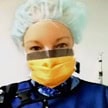-
Asked by GAMm to Jonathan, Kellie, Kevin, Melissa, Stephanie on 25 Apr 2016.
-
Jonathan Jackson answered on 25 Apr 2016:
As a scientist who studies the brain I have had the chance to study lots and lots and lots of things that aren’t directly related to my training as a neuroscientist. For example, I have to understand a bit of nuclear physics, graph theory, molecular biology, genetics, advanced statistics, differential equations, and computational modeling to get through an average week at work. I’m not nearly as good at any of those things as my fellow scientists on this site, but it’s fun to jump into another field for a few hours and understand how some of their latest findings affect my own data and research!
But I haven’t wanted to do anything else for a long time. When I was in 1st grade, I wanted to be a biochemist. In 3rd grade, just a regular chemist. In 8th grade, I wanted to be a stockbroker (don’t ask), and from about 10th grade, I wanted to study the human brain. I didn’t know what I wanted to study at first, but eventually I found my way.
-
-
Stephanie Moon answered on 25 Apr 2016:
Yes! In graduate school I studied viruses and how they infect cells to make us sick. Now as a post-doc, I use yeast (the kind we make bread and beer with) and human cells to study how cells react to stress conditions. Even though these sound like really different things, I study how the cell regulates gene expression, so they are related.
-
Kevin Baker answered on 25 Apr 2016:
During my undergraduate career, I studied honey bees for about a year and a half. We were looking at a parasite that killed honeybees and causes colony collapse disorder. It was a fun experience because I love the outdoors but bee stings hurt! Once I got stung 23 times in one day. After that, I studied how certain germs form homes inside your body using a bacteria called Vibrio cholera. Thankfully I never got it because we are safe about it. Cholera gives you diarrhea. In graduate school, I switched to studying blood clotting. It is nice to get a fresh look at a new thing and you bring all your past experiences/projects to the new study.
-
Kellie Jaremko answered on 25 Apr 2016:
Yes. I have been lucky enough to study many different things, which I think helps me look at obstacles different.
Before acute pain research (around surgery) I worked with patients with chronic pain (years of pain) and the medications that they were on long term. My PhD research looked at the role of stress in opioid addiction. In the past I studied pain in diabetes, hemorrhagic stroke, proteins involved in blood vessel formation, and what makes placentas break in pre-term births.
-
Melissa Wilson Sayres answered on 26 Apr 2016:
Because I’m a computational biologist, I get to study all sorts of things! I’ve studied plants, animals, viruses, and even theoretical questions about how we expect different kinds of chromosomes to evolve under different population scenarios.
Related Questions
do you study blood clotting on bats
What information can we get from studying sex chromosomes?
When you were younger were there any shows that you watched that educated you about becoming a scientist or were you
If you could choose between the other four scientist jobs, which one would you choose?
do you study sperm






Comments